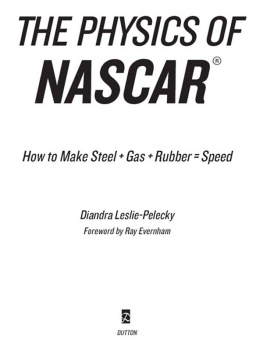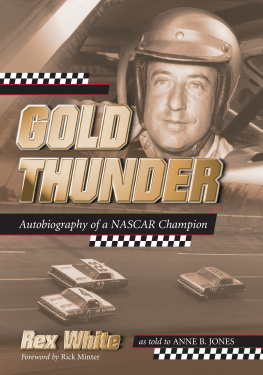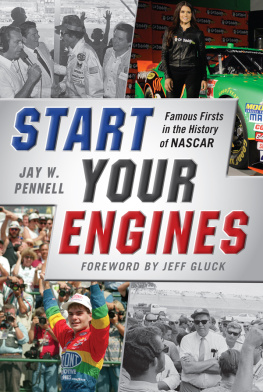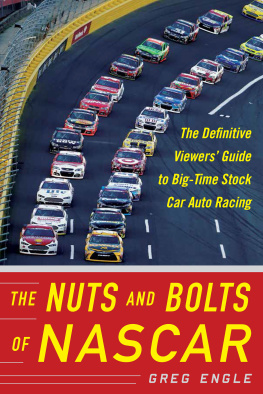Growing Up
NASCAR
Racings Most Outrageous
Promoter Tells All
Humpy Wheeler and
Peter Golenbock

Contents
CHAPTER 1
 We Watched the Race Cars Go By
We Watched the Race Cars Go ByI WAS BORN HOWARD WHEELER IN 1938, but everyone except my mother, brother, and sister called me Humpy. Actually, I am Humpy Jr. My father, Howard Wheeler Sr., played on the Red Grange, Illinois, football team. Bob Zuppke, the famous coach, caught my dad smoking Camel cigarettes his sophomore year. After that, before every practice, Zuppke made Dad run around the field for thirty minutes. From the Camel cigarettes logo, his teammates began calling him Humpy. He later became a coach, and you cant get rid of a nickname in sports. So, when I was born, I became Little Humpy. Then I got into sports, and I have always remained Humpy.
I grew up in Belmont, North Carolina, about seven miles from the old Charlotte Speedway. By the time I was nine years old, there were 5,000 people and 26 cotton mills and absolutely nothing to do.
During World War II, I lived with my grandparents in Bessemer City. My grandfather, Nathan Dobbins, was a carpenter who built houses. This was back in the days when you built a house from start to finish. You framed it, wired it, walled it, roofed it, and painted it. My grandfather could do all of that. My grandfather would let me go out to the woodworking shop with him, and hed run the lathe and let me learn how to do it.
My grandfather rolled his own cigarettes. He smoked Bugler tobacco, which he carried in a pouch. He had two acres of land on which he grew vegetables, and he had half an acre of chickens. By the time I was five years old, I had learned to wring a chickens neck and chop off its head. My grandmother also was self-sufficient. We didnt go to the grocery store a whole lot. She bought meat. My grandfather would go down to the flour mill and buy corn and biscuit flour, and my grandmother would can preserves from fruit they grew for the winter. She cooked on a wood stove with no dials or gauges.
THERE WAS VERY LITTLE entertainment. It was gaunt living. Simple pleasures were appreciated. Most people were living hand to mouth, because, generally, they had four or five kids.
There was no TV. Well, there was TV, but no one had one. After we moved to Belmont, the big decision on Saturday afternoons was where to go to the movies. There was always at least one movie theater in a mill town, and it was always set apart from downtown. We would go to the Iris Theater, named after the owners wife. The other theater was in the East Endas though the town was big enough to have an East Endbut the film had to be damn good for my brother and me to go there, because, if you went, you knew you would have to fight your way back home. It was like being in Baghdad. You had to fight block to block to get home.
The railroad tracks were a block from our house. We lived across the tracks in the wealthier area, though it was a territorial thing more than a class thing. The East End started at the tracks. To the kids from the East End, I was a stranger, and they didnt like strangers coming into their territory. They especially didnt want the so-called uptown kids around their neighborhood.
I was eleven, and my brother was eight. Wed go to the movies down there, and then wed quietly leave, and trouble usually started a block or two later with a rock. Or taunting: Were going to whip your ass. As we got older, it got worse. Those teenage fights could become really vicious. Not only was there territorial warfare, but intercity as well. Mount Holly was two miles away, and if those boys came to Belmont, there was a fight. If we went over there, there was a fight. No question about it. It was so bad that there wasnt a high school football game without a fight in the stands or somewhere else after the game.
Three of the meanest towns were Belmont, Gaffney, and Lincolnton. Fortunately, there was a rigid code of conduct, so there were no knives or blackjacks or guns. Anyone who pulled a knife was a chicken, a blackjack was totally unfair, and a gun was taboo.
There was a meanness in the Scotch-Irish culture that didnt exist in other cultures. This was because of the povertya dour existenceand the lack of ability to laugh and have fun like the Italians do. It also had to do with very strict religious codes that left no place to vent your temper. Some of the fundamentalist religions would not even permit women to wear makeup. They had to wear long dresses, and the lack of access to women added to everyones irritability.
Alcohol laws also contributed to the meanness and violence that were part of the Souths culture. You couldnt legally buy alcohol in a lot of counties in North Carolina. So, instead of having a drink every night, on Friday night you might drink a whole bottle, and that led to trouble. The Scotch-Irish didnt have the tolerance for alcohol that the French or the Italians or even the regular Irish did. After the Scotch-Irish drank, they lost their tempers very quickly.
There was something the Scots called the red. At the point when someone goes red, thats the point when you dont want to be around them. Youd say, Uh-oh, Johnnys going to go red on us. You didnt want to fool around with Johnny when that happened.
And they tended to gang up. There would be groups of boys who would gang up and pick on you. When I was thirteen, I delivered papers. I was probably two miles from my home one afternoon when a gang of six boys I knew pulled up in a car beside me and pushed me off a bank, sending my papers flying into a ditch. A mailman, who had been a Marine in World War II, saw what was going on, and he came to my rescue and stopped it. I told myself, Im going to get every damn one of them back individually, one by one.
After I learned how to fight, and before I was sixteen, I did just that. I would walk up to each one and say, Do you remember the time you pushed me into that ditch? And thenwhap!
GROWING UP CATHOLIC in a Scotch-Irish universe, I spent most of my childhood mad. One outlet I embraced to channel my anger was the sport of boxing. Boxing, not basketball, was the big winter sport. Boxing was popular because the older men recognized that if they could get the kids in the boxing ring, they could eliminate a lot of the street fighting. Once a kid started boxing, he felt it was stupid to hit someone with bare knuckles. I would think, I dont want to break my knuckles on his stupid head. From the time I was eleven through my teenage years, the number of fights I was involved in was unbelievable.
Boxing is a relatively cheap sport, and our boxing club in Belmont was in the basement underneath the jail. The ring was stuck back in the corner of the room, so the ropes on three sides were right against concrete blocks. If you got hit in the chin against the ropes, the back of your head would hit the concrete. As a result, no Belmont boxer ever got caught against the ropes. Belmont had some great boxing teams. All the mill towns had boxing teams. The roughest kids ended up on the boxing teams. I ended up befriending the kids I used to get in fights with because I started boxing with them.
You could go down there when you were ten or eleven, but you didnt start fighting out of town until you were sixteen. A lot of pro boxers came out of Belmont, though most of the kids didnt go on to college but went into the service and ended up on the elite service boxing teams at Camp Lejeune, Norfolk Navy, and the San Diego Marines.








